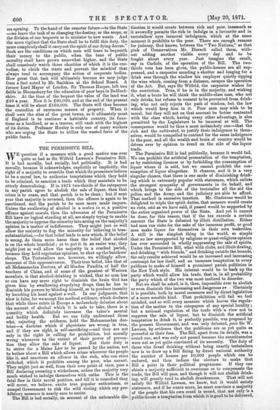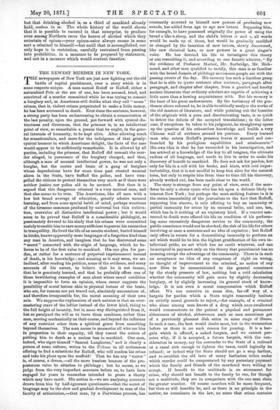THE PERMISSIVE BILL.
WE question if a measure with a good motive was ever quite so bad as Sir Wilfrid Lawson's Permissive Bill.
It is bad morally, bad socially, bad politically. It is bad morally, because it acknowledges, explicitly or implicitly, the right of a majority to override that which its promoters believe to be a moral law, to authorize temptations which they hold to be criminal, to sanction a trade which they maintain to be utterly demoralizing. If in 1871 two-thirds of the ratepayers In any parish agree to abolish the sale of liquor, then that crime is to cease, and that parish is to be clean ; but if next year that majority is reversed, then the offence is again to be sanctioned, and the parish to be once more made impure. Unless the swallowing of alcohol is a mania in se, a positive offence against morals, then the advocates of the Permissive Bill have no logical standing at all, are simply trying to enable the majority to oppress the minority into acting on the majority's opinion in a matter of indifference. They might just as well allow the majority to flog the minority for believing in tran- substantiation,—for that belief leads to acts which, if the belief is wrong, do them more harm than the belief that alcohol is on the whole beneficial ; or to put it in an easier way, they might just as well allow the majority in a cracked parish, because they held vegetarian opinions, to shut up the butchers' shops. The Teetotallers are, however, we willingly allow, innocent of this oppressiveness. Their true belief, like that of all Mohammedan Doctors, of all Hindoo Pundits, of half the teachers of China, and of some of the greatest of Western moralists, is that alcohol-drinking is wicked, that no man has or can have any more right to diminish the brain God has given him by swallowing stupefying drugs, than he has to diminish his powers by blinding himself, or to produce insanity by knocking his head against a wall. In our judgment, that view is false, for we accept the medical evidence, which declares that while there exists in Europe a melancholy delusion about the amount of alcohol which it is safe to take, there is a quantity which definitely increases the taker's mental and bodily health. But we can fully understand those who, rejecting the evidence, hold the Mohammedan doc- trine—a doctrine which if physicians are wrong, is true, and if they are right, is self-sacrificing—and they are not only in the right in calling for prohibition, but morally wrong whenever to the extent of their power of preven-
tion they allow the sale of liquor. But their duty is to strive for a Maine Law to be passed by the nation, not to bother about a Bill which allows crime wherever the people like it, and sanctions an offence in the rich, who can store alchohol, which it prohibits among the poor, who cannot. They might just as well, from their own point of view, pass a Bill declaring swearing a wickedness, unless the majority very much wished to indulge themselves with oaths. This is the fatal flaw in their moral position, and till it is remedied they will never, we believe, excite true popular enthusiasm, or compel Government to risk the wild rioting which any pro- hibitory measure is nearly sure to excite.
The Bill is bad socially, on account of the unbearable dis- tinction it would create between rich and poor, inasmuch as it avowedly permits the rich to indulge in a favourite and in teetotallers' eyes immoral indulgence, which at the same moment it prohibits to the poor. There are enough reasons for jealousy, God knows, between the " Two Nations," as that pink of Conservatives Mr. Disraeli called them, with- out adding another visible every day and to be fought about every year. Just imagine the result, say in Carlisle, of the operation of the Bill. The two- thirds vote has been given, the public-houses are all sup- pressed, and a carpenter mending a shutter and longing :for a drink sees through the window his employer quietly sipping the wine which, coming from a distance, escapes the operation of the Act. But, says Sir Wilfrid, the carpenter wishes for the restriction. True, if he is in the majority, and wishing it, what a brute he will think the middle-class man, who not only drinks, but refuses to consent to be prevented from drink- ing, who not only rejects the path of wisdom, but the law which would keep him in it. Poor men may wish to be moral, but they will not on that account be better contented with the class which, having every other advantage, is also permitted by the Legislature to be immoral at will. The consequence would be thus a most melancholy one—that the rich and the cultivated, to justify their indulgence to them- selves, would be compelled to contend for the same indulgence to the poor, and all the wealth and brain of country would be driven over by opinion to stand on the side of the liquor trade.
The Permissive Bill is bad politically, because it would fail. We can prohibit the artificial presentation of the temptation, as by restricting licences or by forbidding the consumption of liquor where it is sold, but we cannot prohibit the con- sumption of liquor altogether. It chances, and it is a very singular chance, that there is one mode of diminishing drink- ing which is extremely popular with statesmen, which enlists the strongest sympathy of governments in its behalf, and which brings to the side of the teetotaller all the aid the police, and the Army, and the judiciary are able to afford. That method is excessive taxation. Mr. Gladstone would be delighted to triple the spirit duties, that measure would create no riots, and as we have said, if passed would be supported by the entire organized power of the State. And yet it cannot be done, for this reason, that if the tax exceeds a certain amount the State is defeated by illicit distillation. Either bad men run risks for the sake of the immense profit, or good men make liquor for themselves in their own teakettles. A still is the simplest thing in the world, so simple that no law unsupported by religious or quasi-religious opinion has ever succeeded in wholly suppressing the sale of spirits. Under the Permissive Bill, what with clubs, and illicit dealing, and drinking " with friends," and drinking outside the bounds, the only results achieved would be an increased and increasing contempt for law itself, and an immense temptation to every publican to make of himself a prominent parish politician in the New York style. His interest would be to back up the party which would allow his trade, that is, in all probability the party which of the two was most inclined to disorder.
But we shall be asked, is it, then, impossible ever to abolish or even diminish this increasing and dangerous ev : 1Certainly it is possible, both by moral measures and by direct legislation of a more sensible kind. That prohibition will fail we feel satisfied, and so will every measure which leaves the regula- tion of the matter to the ratepayers of any special locality ; but a national regulation of the trade with a view not to suppress the sale of liquor, but to diminish the artificial temptation to drink it, is perfectly possible, was proposed by
the present Government, and was only defeated, pace Sir W. Lawson, by evidence that the publicans are as yet quite as
powerful as their foes. The Bill, apart from its details, was a sound one, and was only not passed because the constituencies were not as yet quite convinced of its necessity. The duty of those who dread drinking without being exactly teetotallers now is to draw up a Bill fixing by direct national authority the number of houses per 10,000 people which can be endured, and then induce the electors to make that Bill a point in their political programme. If they can obtain a majority sufficient to overcome or to compensate the trade, the Bill will pass, and though it will not abolish drink- ing, will greatly tend to abolish drunkenness. That will not satisfy Sir Wilfrid Lawson, we know, but it would satisfy statesmen, and if he wants more, he must convince a majority of the people that his own creed is sound, that not only is a public-house a temptation from which it is good to be delivered,
but that drinking alcohol is, as a third of mankind already hold, manna in se. The whole history of the world shows that it is possible to succeed in that enterprise, to produce even among Northern races the horror of alcohol which they entertain of opium—your opium-eater always seems in some sort a criminal to himself—but until that is accomplished, our only hope is in restriction, carefully restrained from passing into prohibition, in a measure to be prepared by statesmen, and not in a measure which would content fanatics.



































 Previous page
Previous page